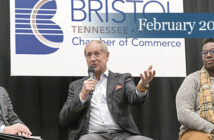Photo above: (L-R) Vince Baranauskas, Rick Claus, Dallas McKinney and Jeff Dinger
The first in the 2018 series of three “Operation Tomorrow’s Workforce” articles by United Way of Southwest Virginia

Baranauskas and McKinney at Nanosonic
According to the Annie E. Casey Foundation, roughly 3,000 of Southwest Virginia’s youth between the ages of 16 and 19 aren’t in school or working. United Way of Southwest Virginia is developing solutions to address the workforce gap, starting with the emerging workforce; one solution is a high school internship program.
Students who complete internships during the latter years of high school gain awareness of local opportunities, build skills needed to find and keep a job, assist with post-secondary planning, and fill workplace gaps. These internship programs can be seen across the globe, across the country, and across our region.
Jeff Dinger, special projects manager for Giles County, said, “It’s incumbent upon us, especially rural America, to do everything we can to encourage our young people to be able to stay in our communities. But we also need to attract more businesses like the great ones we already have, so our young people have the opportunity to stay. If we allow our talented young kids to grow to their potentials, this emerging workforce becomes a powerful factor in improving our economy.”
In Giles County, Dinger oversees the summer youth work program, currently in its sixth year serving fifty high school students. The program tailors the internship placements to the interests, aptitudes, and dreams of each participant.
Students have been placed as interns with state parks, supermarkets, graduate research laboratories, IT departments, and more. What’s behind the success of the program is a lot of passion, planning, and collaboration. It may be the county’s program, but Dinger said what makes the program work is a very genuine and open collaboration between government, employers, non-profits, and school systems.
Many school counselors guide students to apply for the program. Former intern Dallas McKinney said, “When I received the program application from my guidance counselor, I wrote down that I was interested in polymer chemistry. I’d just read something online about it and thought it sounded cool.”
McKinney, a 2014 senior at Narrows High School, just so happened to find his polymer chemistry internship with NanoSonic, an award-winning high-tech company in Giles County.
He found out that NanoSonic was actually “cool” – they partner with organizations like NASA and the U.S. Departments of Defense, Homeland Security, and Agriculture to produce innovative materials that bypass the limitations of normal materials. Polymers they create include flexible, heat resistant, and puncture resistant material used for firefighter gloves, thermal protection systems for spacecraft entering back into the atmosphere, or flexible, rubber-like metal for stretchable electronics.
McKinney said, “I think knowing what was in ‘that building over there’ definitely widened the horizon on what I could do, where I could go, and what opportunities are available here in Giles County.”
As the first high school intern at NanoSonic, McKinney spent the summer on many projects, including testing chemical sensors in the dark for light sensitivity. A few perks to the job included access to industry-specific high technology equipment and the ability to work as a group with staff members across departments, including Vince Baranauskas, chief technology officer and one of McKinney’s mentors.
Baranauskas said, “Dallas was able to set up reactions and perform them himself, make composites, prepare samples, and he even helped with report writing. He wore multiple hats and really got a feel for what it was like to do fundamental research, applied research, and then take it to the next level for various applications.” McKinney continued to intern for NanoSonic each summer when he returned home from college.
Richard Claus, president and chief executive officer for NanoSonic, said, “We got to know Dallas as he worked for us over the first summer. We welcomed Dallas back again for two more summers – we knew him, and he knew us.”
McKinney’s responsibilities at NanoSonic grew, and so did his knowledge and enjoyment of his role working with materials. When he graduated from college (in only three years) with a degree in applied physics, NanoSonic hired him. Now, he works at NanoSonic as a lab technician and will be soon studying for his PhD at Virginia Tech. McKinney said, “I’ve actually molded my course load to focus on material science because of NanoSonic.” The path before him in polymer chemistry has been shaped because of what he experienced through his internship.
Across the region, other internship programs exist in similar partnerships between multiple sectors – government, school systems, non-profits, and employers. The newest internship effort is spearheaded by United Way of Southwest Virginia, which currently serves 29,000 students with its career readiness program Ignite.
United Way of Southwest Virginia’s implementation of high school internships alleviates some of the challenges operating an internship program entails: recruiting participants and employers, matching and supporting youth and worksites, monitoring program implementation, and connecting the program to year-round programming.
The internships will integrate with current high school components of Ignite, including soft skills curriculum and web-based career exploration software provided by United Way – already in use by the students. United Way of Southwest Virginia will coordinate internships through the state-of-the-art software, so job matching will be customized to each student’s career goals and plans, and employers will be able to digitally post opportunities and sort applications.
Travis Staton, president and CEO of United Way of Southwest Virginia said, “We must invest in our youngest citizens to see improvement in outcomes related to adult self-sufficiency. We are placing importance on connecting the worlds of learning and work to prepare our new generation for their futures and provide them with the opportunity to stay here in Southwest Virginia.”
As local employers partner with United Way’s Ignite program across Southwest Virginia, Giles County remains a shining example of success and a reminder that sometimes, you have to see it to be it.




